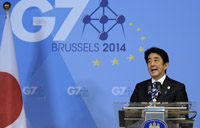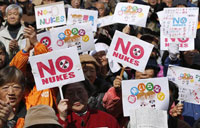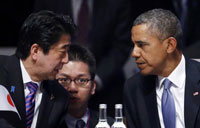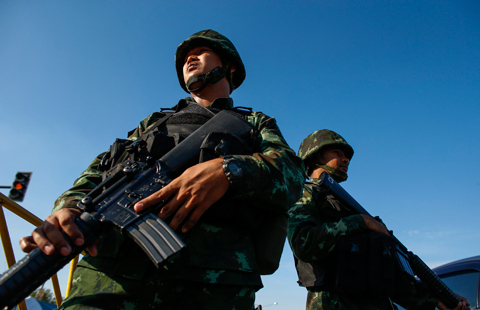Abe 'an obstacle' to improved relations
By Wu Jiao and Zhang Yunbi (China Daily) Updated: 2014-06-10 01:51
 |
| Abe's anti-China thinking exposed at G7 summit |
 |
| Japan underreports 640 kg unused plutonium to IAEA |
 |
| Japan to turn over nuclear material to US |
Relations have been buffeted since Japan seized a Chinese fishing boat near China's Diaoyu Islands in 2010.
Public opinion reflected the downturn in relations with 90 percent of people surveyed in each country expressing negative opinions about the other nation — a record low —according to a poll last year by China Daily and the Japanese nonprofit organization Genron NPO. However, more than 70 percent of those surveyed also acknowledged that bilateral relations are "important".
Several groups of Japanese politicians and business leaders visited China earlier this year and Tang Jiaxuan, former state councilor in charge of foreign affairs, visited Japan recently to attend forums.
Several senior Japanese politicians, including Yasushi Akashi, the 83-year-old former under-secretary-general of the United Nations, and Yuji Miyamoto, former ambassador to China, came to China for preparatory talks for the annual semi-official Beijing-Tokyo Forum.
Recently, Abe called for nations to press China on the South China Sea issue at a meeting in Singapore.
There has been wide speculation that Abe is trying to build an anti-China alliance within the international community.
Zhao Qizheng, chairman of the foreign affairs committee of the 11th National Committee of the Chinese People's Political Consultative Conference, China's top political advisory body, said Abe's actions have crossed red lines and are doomed to fail.
If Abe does not change, it is hard to promote further exchanges, and it will be impossible to have the leaders meet in the near future, Zhao said.
According to Zhao, the Abe administration should reflect on its attempts to isolate China.
"At present we still have not seen a willingness by Abe to resolve problems between the two countries," Zhao said.
Senior Japanese politicians have also voiced their concern over their government's policies.
According to Akashi, who is also chairman of the International House of Japan, people from both countries should reflect on history so that they will not repeat mistakes.
The downturn in ties came amid geopolitical changes in Asia-Pacific, with China overtaking Japan as the world's second-largest economy and the US advancing its Asia pivot.
Li Wei, director of the Institute of Japanese Studies at the Chinese Academy of Social Sciences, said that despite huge areas of disagreement, both countries seek regional stability, and if they can identify specific areas of potential cooperation it could herald a breakthrough.
Contact the writers at wujiao@chinadaily.com.cn and zhangyunbi@chinadaily.com.cn
- China demands Japan explain plutonium underreporting
- Japan fails to report 640 kg of unused plutonium to IAEA
- Japan underreports 640 kg unused plutonium to IAEA
- China urges Japan to learn from germany's example
- China criticizes Japan for stoking up 'China threat'
- Abe playing an unwinnable game
- Abe's anti-China thinking exposed at G7 summit










